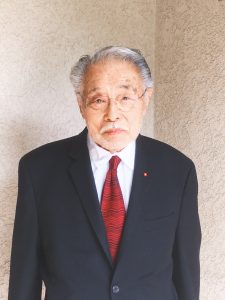Nisei was a longtime leader in L.A.’s Japanese American community.

Korean War veteran Min Tonai is working on a memoir for his grown children. (Photo: George Toshio Johnston)
Minoru Tonai of Woodland Hills, Calif., died on Sept. 4. He was 94.
An active member of Los Angeles’ Japanese American community, Tonai was involved in such organizations as the Japanese American National Museum as a board member, the Japanese American Cultural and Community Center as its president, the Japanese American Korean War Veterans as its president and treasurer, the UCLA Foundation, UCLA’s Business Economic Council, the Amache Historical Society and Terminal Islanders.
In a news release, the Manzanar Committee mourned Tonai’s death.
“I’ve known Min since 1991, when I met him at UCLA when I was the coordinator of UCLA’s year of events commemorating the ‘50th Anniversary of Japanese American Internment,’” said Gann Matsuda of the Manzanar Committee. “Min was a key player in helping organize our opening ceremony in Royce Hall, especially in identifying and locating many of the approximately 200 former UCLA students who were forced to leave the university before completing their studies because of the forced removal.”
A son of Issei immigrants Toyone and Gengoro Tonai, Min Tonai was born in San Pedro, Calif., and with older siblings Ichiro, Mizuyo and Rumi, and younger brother Yutaka, grew up on Los Angeles County’s Terminal Island. He was profiled in the Nov. 6, 2020, issue of the Pacific Citizen.
After Japan’s military attacked the U.S. Navy at Pearl Harbor in the territory of Hawaii on Dec. 7, 1941, the Tonai family would be uprooted and incarcerated — along with thousands of other U.S. citizens of Japanese ancestry and legal permanent resident Japanese nationals ineligible at the time to become naturalized U.S. citizens — first at an assembly center, then at one of the 10 concentration camps operated by the federal government’s War Relocation Authority. In the case of the Tonais, it was Amache WRA Center in Colorado.
According to Min Tonai’s recollection that appeared in the P.C., his father was arrested on the evening of Dec. 7, 1941.
“At 8:30 that evening, the doorbell rings, and there’s two guys in black suits. They said they wanted to talk with Gengoro — my father,” Tonai said. “I said, ‘Just a moment please.’
“I knock on his bedroom door, and I said, ‘There’s two hakujin that want to talk to you.’
“My father comes out of his room wearing his three-piece suit, put on his overcoat, put on his hat and went out the door with them.
“They told me, ‘We just want to talk with him at the Los Angeles County Jail for one hour. But we never saw him until 1944.” Until he was reunited with his family in Colorado, the Tonai patriarch had been shuttled to several different federal incarceration sites:Terminal Island Penitentiary, Ft. Missoula, Mont., Livingston, La., and Santa Fe, N.M.
After WWII and returning to Los Angeles, Tonai graduated from high school and enrolled at the University of California, Los Angeles. His eventual marriage to Mary Mitsuko Endo was delayed by America’s entry into the Korean War. Tonai was drafted into the Army and was stationed for a time in Japan, where he was able to visit relatives. But it was only a matter of time until he was sent to Korea, where he served as a combat medic.
After his stint in the Army, Tonai returned to Los Angeles, completed his business administration degree at UCLA in 1955, got married in 1956 and started a family. Min and Mary Tonai were married for 60 years, and they raised three children. One of the challenges he remembered was finding a job after graduating.
Tonai told the Pacific Citizen that despite earning grades of B+ or better in his major, his job interviews were stymied by the racial attitudes of the time. “I was more than qualified. But the companies would say, ‘Don’t call us, we’ll call you.’ That was a kiss off. I knew that.” He recalled how one company that liked his grades, extracurricular activities and personality — but the rep told him, “We can’t hire Orientals.”
Delayed but undeterred, Tonai told the Pacific Citizen that he took a bookkeeping job, which led to a job as a cost accountant, which would then pave the way to earning titles like VP of finance. At Symbolics Inc., he would serve as its chief financial officer.
Accolades would follow in the years to come In 1999, Tonai was Nisei Week Japanese Festival’s grand marshal; in 2008, he receive ed Nisei Week’s Nikkei Pioneer Award; in 1998, he received the UCLA Asian American Studies Center’s Lifetime Achievement Award; and in 2005, he received the JACCC’s Chairman’s Award.
The Japanese government awarded him its Rising Sun, Gold Rays with Rosette honor in 2015 for promoting the status of Nikkei community in the U.S. and aiding in the mutual understanding between the nations.
Tonai was predeceased by his wife, Mary, in 2017, and his siblings. He is survived by his daughters, Susan Tonai Drews and Teresa Tonai, and son, John Tonai, as well as sisters-in-law, Yae Nagai, Elinor Sakado and Carole Endo; brother-in-law, George Endo; and many nieces, nephews and their families.
A celebration of life for Min Tonai is scheduled for 2 p.m. on Oct. 14 at the Japanese American Cultural and Community Center, in Little Tokyo in downtown Los Angeles.



